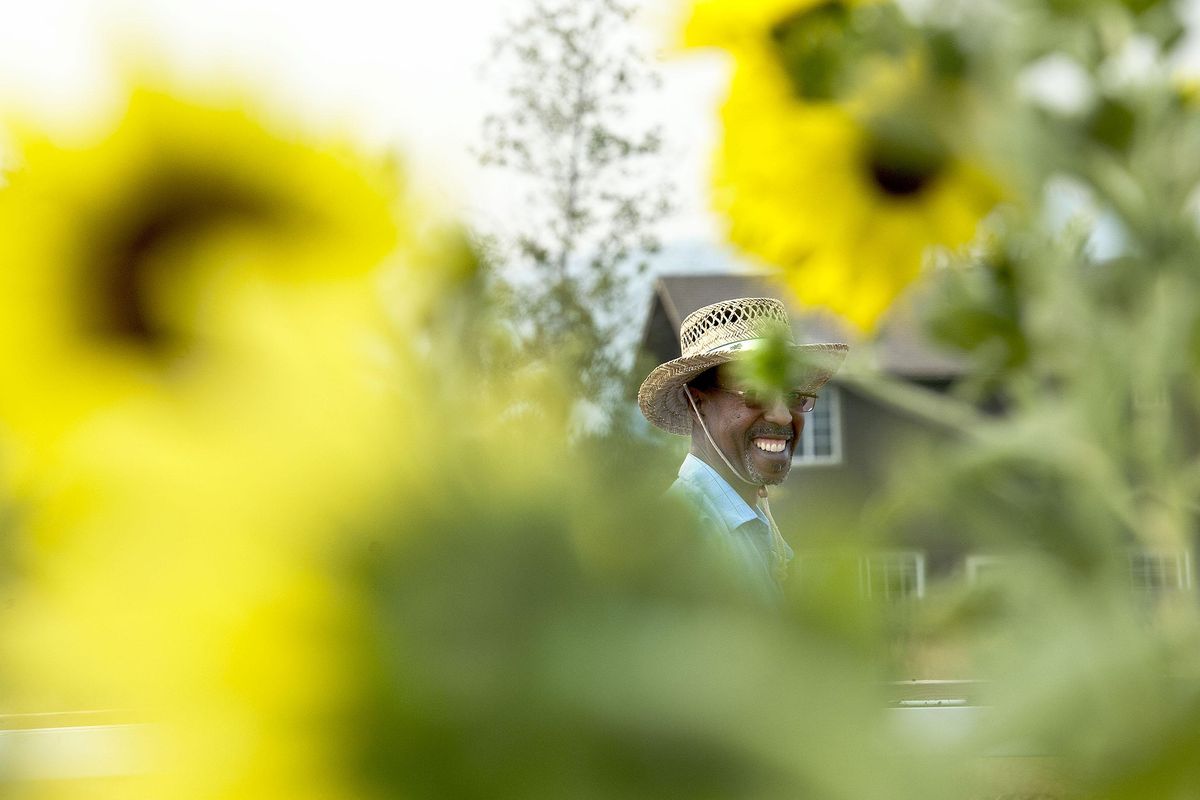Tending nature’s bounty: Denominations come together for Spokane Valley garden

Michelle Thompson would be the first to admit she’s never had a green thumb. But as she watered rows of Jamaican spinach in a Spokane Valley community garden Wednesday morning, she was swept by a surge of joy.
Thompson lifted her head toward the sky and let fly a rendition of “I Then Shall Live,” a favorite gospel song.
“I’m drawn to where a need is, and there’s a need to care for these plants that are going to be a miraculous harvest,” she said.
The garden she was working in is a community effort by the Spokane Valley Adventist Church on a two-acre plot of formerly vacant land.
It’s the brainchild of parishioner Rupert Salmon, who joined the Valley church three years ago. Over the course of his life Salmon had criss-crossed the country, from New Jersey to Florida to Louisiana, but always found a way to garden no matter where he was.
“Everywhere I’ve been, even if it was an apartment, I’ve had something growing in a pot,” he said.
When he moved to the Valley church, he was perplexed by the expanse of dirt and patchy grass sitting unused.
“I’m like, ‘So, why are we watering all this land and just having it sit and do nothing?’” he said. The church told him they’d had a few ideas to do something with the land, but no one had gotten around to making them a reality.
Salmon proposed starting a garden.
“I said, ‘I’ll do it!’” he said. He got approval in February, and started building beds with about $900 from the church and donations from individual members.
“It was kind of divine providence,” he said.
Though the project is still in its first season, Salmon has big goals: to teach gardening, provide food for formerly homeless people, inspire culinary experimentation and maintain a healthy population of bees. Eventually, he said, the land could support about 50,000 pounds of food feeding 1,200 people a year if it’s rotated well.
“As soon as something is going out, we’re putting something else in,” he said.
Salmon is working in conjunction with Pope Francis Haven, a new apartment complex built by Catholic Charities for formerly homeless families that’s just one street over. The produce grown in the garden so far has been donated, he said, and the hope is to empower families in the apartments to grow their own food.
The garden has a cluster of 18 raised beds in the section closest to the church, growing varieties of eggplants, cucumbers, hot peppers, tomatoes and more. There’s space for six clusters like it going down to the fence line on the south edge of the property.
Salmon hopes raised beds could be given to individual families to tend to. There are also larger communal areas: rows of corn approaching five feet tall and humming with bees, and newly-planted rows of fall and winter greens and plants like broccoli.
Next to the beds is a homemade planter for strawberries: a grid of 4x4 and 2x4 boards supporting rows of drainpipe where the berries are planted. Salmon laughs at the simplicity of it: a ten-foot section of pipe costs just $10.
“That’s all it is,” he said.
A patchwork of volunteers keeps the garden running. Church members like Thompson chip in, sometimes learning new skills in the process. Salmon said he’s there most mornings, watering plants or shoveling mulch for a few hours before heading to his office job in downtown Spokane.
Help has also come from members of the Mormon Church in Spokane Valley. A group of seven young missionaries joined Salmon Wednesday to haul mulch to the next set of rows destined to grow lettuce and greens.
In keeping with the custom of their mission, they asked to be identified only by their last name and appropriate title: Elder for men and Sister for women. The practice keeps the focus off their identity as individuals, they said.
“We really only represent church and our family,” said Elder Francis.
It’s a common misconception that Mormon missionaries spend all their time knocking on doors trying to convert people, they said. Though that’s part of the mission, Francis said, it goes deeper than that. Service work is part of striving to be Christlike, and allows missionaries to “hopefully be able to show them an example of the things Christ did,” he said.
Salmon said the interfaith collaboration works well to keep the garden running. Adventists observe Sabbath and hold services on Saturdays, while Mormons observe on Sundays. The Adventist congregation can handle watering and other work on Sunday while Mormons are resting so the plants still get cared for.
As the missionaries shoveled mulch, Thompson changed tunes, singing “Alabaster Box,” which recounts a Biblical story where a woman washed Jesus’ feet and anointed him with oil.
The time outside brings her closer to God, she said, and she hopes Salmon’s gift for gardening can do the same for others.
“There are lots of people that live in apartments that would like to get their hands in the dirt,” she said.
For her, it’s a chance to practice for her role as a church vocalist.
“As I’m working, I’m learning new songs,” she said.
Hearing her song over the rows of corn and squash, the missionaries smiled. Sister Kauvaka said the song was one of her favorites. Elder Collins nodded.
“I’d buy that soundtrack,” he said, shoveling mulch into a wheelbarrow.